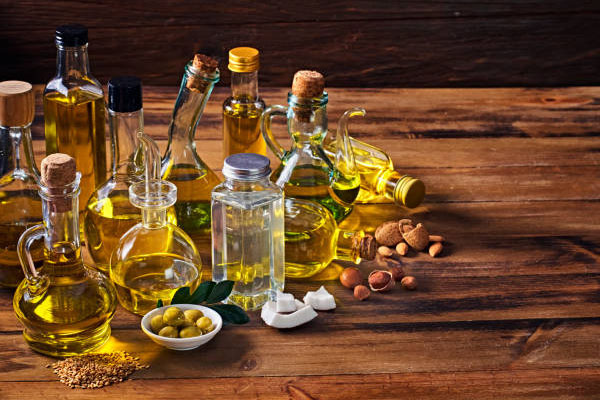What's the Healthiest Cooking Oil for Your Diet?
Explore the world of cooking oils and find out what s the healthiest cooking oil for your diet Learn about the benefits, smoke points, and culinary applications of various oils to make informed dietary choices
What's the Healthiest Cooking Oil for Your Diet?
When it comes to making informed dietary choices, one of the crucial considerations is the type of cooking oil you use. Cooking oils play a significant role in the flavor, nutrition, and overall health impact of your meals. With an array of options available, each with its unique set of qualities and characteristics, the task of choosing the healthiest cooking oil for your diet can be both exciting and challenging.
But fret not, for in this comprehensive guide, we will navigate the intricate world of cooking oils, exploring their diverse properties, smoke points, health benefits, and culinary applications. By the end, you'll be equipped with the knowledge needed to select the perfect oil to complement your culinary creations and promote your overall well-being.
Let's embark on this journey to discover the art of oil selection and unleash the flavors, nutrition, and health benefits that the right cooking oil can bring to your table.

Introduction to Cooking Oils
When it comes to your diet and culinary choices, the type of cooking oil you use can have a significant impact on your health. Cooking oils are not created equal, and some are better suited for specific cooking methods and health goals than others.
In this comprehensive guide, we will delve into the world of cooking oils, exploring their various types, health benefits, and concerns. By the end, you'll have a better understanding of which cooking oil is the healthiest choice for your diet.
Understanding Different Types of Cooking Oils
Before we determine which cooking oil is the healthiest for your diet, it's essential to understand the various types of cooking oils available and their unique characteristics. Each oil has its own set of benefits and best-use scenarios, so let's take a closer look at some popular choices:
1. Olive Oil - A Heart-Healthy Option
Olive oil is renowned for its heart-healthy properties and rich, fruity flavor. It's packed with monounsaturated fats, which can help lower bad cholesterol levels. We'll explore its uses in both cooking and as a finishing oil in this section.
2. Coconut Oil - Is It as Healthy as It Seems?
Coconut oil has gained popularity in recent years, but is it as healthy as its proponents claim? We'll discuss its unique composition, potential health benefits, and situations where it's best used.
3. Avocado Oil - Nutrient-Rich and Versatile
Avocado oil is celebrated for its high content of healthy fats and an abundance of vitamins and minerals. Discover how it can be a versatile addition to your culinary repertoire and what makes it stand out.
4. Canola Oil - The Low-Saturated-Fat Choice
Canola oil is known for its low saturated fat content and neutral flavor. Learn when it's a suitable option for cooking and how it compares to other oils in terms of health benefits.
5. Peanut Oil - Great for High-Heat Cooking
Peanut oil's high smoke point makes it an excellent choice for deep frying and high-heat cooking. We'll discuss its flavor profile and why it's preferred in specific cuisines.
Comparing Smoke Points
The smoke point of a cooking oil is a critical factor when deciding which one to use for different culinary applications. It's the temperature at which an oil begins to break down and produce smoke, indicating that it's no longer safe for cooking. Understanding the smoke points of various oils can help you choose the right one for your preferred cooking methods. Let's examine the smoke points of some common cooking oils:
- Butter: 350буF (177буC)
- Extra Virgin Olive Oil: 325-375буF (163-191буC)
- Coconut Oil: 350буF (177буC)
- Avocado Oil: 375-400буF (191-204буC)
- Canola Oil: 400буF (204буC)
- Peanut Oil: 440буF (227буC)
- Soybean Oil: 450буF (232буC)
- Vegetable Oil: 400-450буF (204-232буC)
- Corn Oil: 450буF (232буC)
- Grapeseed Oil: 420буF (216буC)
- Safflower Oil: 450буF (232буC)
- Sunflower Oil: 440буF (227буC)
- Flaxseed Oil: 225буF (107буC)
- Walnut Oil: 320буF (160буC)
- Hempseed Oil: 330буF (166буC)
- Sesame Oil: 410буF (210буC)
Health Benefits and Concerns
When it comes to choosing the healthiest cooking oil for your diet, it's essential to consider the potential health benefits and concerns associated with different oils. Let's delve into the factors that make some cooking oils a healthier choice than others:
1. Omega Fatty Acids in Cooking Oils
The balance of omega-3 and omega-6 fatty acids in an oil can influence its impact on your health. We'll explore which oils are rich in heart-healthy omega-3s and discuss the importance of maintaining a proper balance between these essential fats.
2. Antioxidants and Anti-Inflammatory Properties
Certain cooking oils contain antioxidants and anti-inflammatory compounds that can support your overall well-being. We'll examine which oils offer these benefits and how they can contribute to a healthier diet.
3. Potential Health Risks of Certain Oils
Not all cooking oils are without potential drawbacks. We'll discuss the health concerns associated with specific oils, such as high saturated fat content or the formation of harmful compounds when heated to high temperatures.
Choosing the Right Oil for Different Cooking Methods
Not all cooking oils are created equal, and their suitability for various cooking methods can vary significantly. To make the healthiest choices in the kitchen, it's important to match the right oil with the specific cooking technique you plan to use. Let's explore which oils are best suited for different cooking methods:
- Olive Oil:
- Best For: Sauteing, roasting, grilling, and salad dressings.
- Notes: Extra virgin olive oil is best used in salads and as a finishing oil due to its low smoke point. Regular olive oil can be used for light sauteing and roasting.
- Coconut Oil:
- Best For: Baking, sauteing, and frying at low to medium heat.
- Notes: Coconut oil's distinct flavor makes it an excellent choice for baking and sauteing, but it may not be suitable for high-heat frying.
- Avocado Oil:
- Best For: High-heat cooking, grilling, and roasting.
- Notes: Avocado oil has a high smoke point, making it ideal for various cooking methods, including frying and grilling.
- Canola Oil:
- Best For: Frying, baking, and sauteing.
- Notes: Canola oil's neutral flavor and high smoke point make it suitable for a wide range of cooking techniques.
- Peanut Oil:
- Best For: Deep frying and high-heat cooking.
- Notes: Peanut oil's high smoke point and mild flavor make it a top choice for deep frying and stir-frying.
- Sesame Oil:
- Best For: Stir-frying and as a flavor enhancer.
- Notes: Toasted sesame oil adds a rich, nutty flavor and is best used in stir-fries and as a finishing touch on Asian dishes.
- Grapeseed Oil:
- Best For: High-heat cooking and baking.
- Notes: Grapeseed oil has a high smoke point and a mild flavor, making it versatile for various cooking methods.
- Sunflower Oil:
- Best For: Frying and baking.
- Notes: Sunflower oil is a good choice for frying due to its high smoke point, but it may not add a distinct flavor to dishes.
- Corn Oil:
- Best For: Frying, grilling, and baking.
- Notes: Corn oil's high smoke point and neutral taste make it suitable for a variety of cooking applications.
- Safflower Oil:
- Best For: Frying and baking.
- Notes: Safflower oil has a high smoke point and can be used for deep frying and baking.
Frequently Asked Questions
1. What Makes an Oil 'Healthy' for Cooking?
Healthy cooking oils are those that are low in saturated fats and high in unsaturated fats, particularly monounsaturated and polyunsaturated fats. These oils also contain beneficial compounds like antioxidants and anti-inflammatory agents that promote overall health.
2. Are Saturated Fats in Oils Always Unhealthy?
Saturated fats are not always unhealthy, but excessive consumption may contribute to heart disease. The key is moderation. Some oils, like coconut oil, are high in saturated fats but may offer other health benefits when used in moderation.
3. Can I Use Olive Oil for High-Heat Cooking?
Extra virgin olive oil has a relatively low smoke point, so it's not ideal for high-heat cooking. However, regular olive oil with a higher smoke point can be used for moderate-heat cooking. For high-heat methods, consider oils with higher smoke points, like avocado or peanut oil.
4. How Do I Store Cooking Oils to Maintain Freshness?
To keep cooking oils fresh, store them in a cool, dark place away from direct sunlight and heat sources. Seal the containers tightly to prevent oxidation. Check for the oil's expiration date and use it within that time frame for the best quality and flavor.
Frequently Asked Questions
- Q1: Can I use olive oil for frying?
A1: Extra virgin olive oil is not recommended for frying due to its low smoke point. However, regular olive oil with a higher smoke point can be used for moderate-heat frying. For deep frying or high-heat cooking, consider oils with higher smoke points, such as canola or peanut oil.
- Q2: What should I consider when storing cooking oils?
A2: Proper storage is essential to maintain the freshness of cooking oils. Store them in a cool, dark place, away from direct sunlight and heat sources. Seal the containers tightly to prevent oxidation. Check for the oil's expiration date and use it within that time frame for the best quality and flavor.
- Q3: Are saturated fats in cooking oils harmful to health?
A3: Saturated fats can contribute to heart disease when consumed in excess, but they're not inherently harmful. Some oils, like coconut oil, are high in saturated fats but may offer other health benefits when used in moderation. The key is to consume them in balance with unsaturated fats.
- Q4: What makes an oil 'heart-healthy' for cooking?
A4: Heart-healthy cooking oils are those low in saturated fats and high in unsaturated fats, such as monounsaturated and polyunsaturated fats. They also contain beneficial compounds like antioxidants and anti-inflammatory agents that promote overall cardiovascular health.
- Q5: Can I use avocado oil for baking and roasting?
A5: Yes, avocado oil is an excellent choice for baking and roasting. It has a high smoke point and a neutral flavor, making it versatile for various cooking methods. Its high monounsaturated fat content also adds a healthful touch to your dishes.
